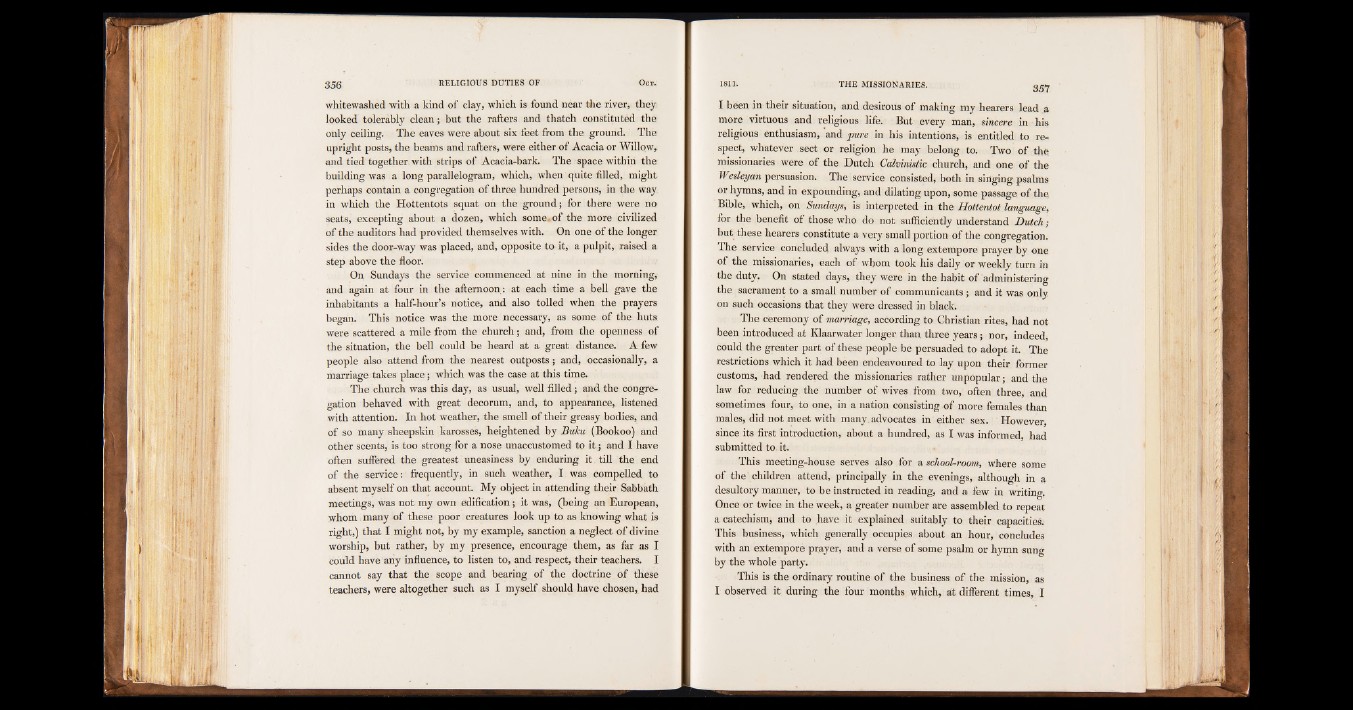
whitewashed with a kind of clay, which is found near the river, they
looked tolerably clean; but the rafters and thatch constituted the
only ceiling. The eaves were about six feet from the ground. The
upright posts, the beams and rafters, were either of Acacia or Willow,
and tied together, with strips of Acacia-bark. The space within the
building was a long parallelogram, which, when quite filled, might
perhaps contain a congregation of three hundred persons, in the way
in which the Hottentots squat on the ground; for there were no
seats, excepting about a dozen, which some.of the more civilized
of the auditors had provided themselves with. On one of the longer
sides the door-way was placed, and, opposite to it, a pulpit, raised a
step above the floor.
On Sundays the service commenced at nine in the morning,
and again at four in the afternoon : at each time a bell gave the
inhabitants a half-hour’s notice, and also tolled when the prayers
began. This notice was the more necessary, as some of the huts
were scattered a mile from the church; and, from the openness of
the situation, the bell could be heard at a great distance. A few
people also attend from the nearest outposts; and, occasionally, a
marriage takes place; which was the case at this time.
The church was this day, as usual, well filled; and the congregation
behaved with great decorum, and, to appearance, listened
with attention. In hot weather, the smell of their greasy bodies, and
of so many sheepskin karosses, heightened by Buhu (Bookoo) and
other scents, is too strong for a nose unaccustomed to i t ; and I have
often suffered the greatest uneasiness by enduring it till the end
of the service:! frequently, in such weather, I was compelled to
absent myself on that account. My object in attending their Sabbath
meetings, was not my own edification; it was, (being an European,
whom many of these poor creatures look up to as knowing what is
right,) that I might not, by my example, sanction a neglect of divine
worship, but rather, by my presence, encourage them, as far as I
could have any influence, to listen to, and respect, their teachers. I
cannot say that the scope and bearing of the doctrine of these
teachers, were altogether such as I myself should have chosen, had
I been in their situation, and desirous of making my hearers lead a
more virtuous and religious life. But every man, sincere in his
religious enthusiasm, and pure in his intentions, is entitled to respect,
whatever sect or religion he may belong to. Two of the
missionaries were of the Dutch Calvinistic church, and one of the
Wesleyan persuasion. The service consisted, both in singing psalms
or hymns, and in expounding, and dilating upon, some passage of the
Bible, which, on Sundays, is interpreted in the Hottentot language,
for the benefit of those who do not sufficiently understand Dutch;
but these hearers constitute a very small portion of the congregation.
The service concluded always with a long extempore prayer by one
of the missionaries, each of whom took his daily or weekly turn in
the duty. On stated days, they were in the habit of administering
the sacrament to a small number of communicants; and it was only
on such occasions that they were dressed in black.
The ceremony of marriage, according to Christian rites, had not
been introduced at Klaarwater longer than three years; nor, indeed,
could the greater part of these people be persuaded to adopt it. The
restrictions which it had been endeavoured to lay upon their former
customs, had rendered the missionaries rather unpopular; and the
law for reducing the number of wives from two, often three, and
sometimes four, to one, in a nation consisting of more females than
males, did not meet with many , advocates in either sex. However,
since its first introduction, about a hundred, as I was informed, had
submittedto.it.
This meeting-house serves also for a school-room, where some
of the children attend, principally in the evenings, although in a
desultory manner, to be instructed in reading, and a few in writing.
Once or twice in the week, a greater number are assembled to repeat
a catechism, and to have it explained suitably to their capacities.
This business, which generally occupies about an hour, concludes
with an extempore prayer, and a verse of some psalm or hymn sung
by the whole party.
This is the ordinary routine of the business of the mission, as
I observed it during the four months which, at different times, I